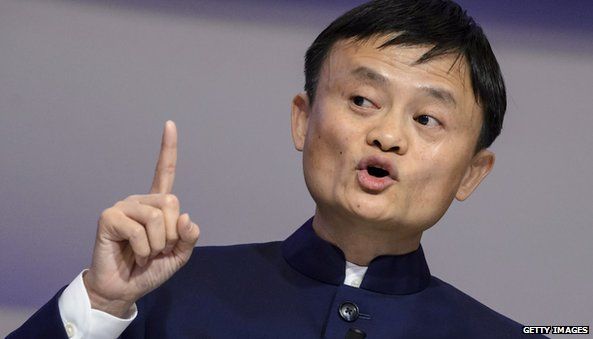Alibaba engages in harshly worded spat with Chinese watchdog
- Published

Alibaba, China's biggest net retailer, has engaged in a rare public row with one of the country's watchdogs.
The spat was prompted by the regulator's claim that Alibaba was "failing" to tackle illegal business being carried out on its platforms.
The company has reacted by accusing the watchdog of being "biased" and "wrong", adding that it plans to file a formal complaint of its own.
About 279 million buyers, and 8.5 million sellers use the firm's sites.
The company's founder, Jack Ma, announced last week that he intended to swell its number of customers to two billion people within the next decade by expanding across the world, posing a threat to eBay, Amazon and others. A clash with the authorities in its home market could prove a major distraction.
Alibaba previously acknowledged that its efforts to tackle the sale of counterfeit goods "may not always be successful", in documents filed ahead of its $25bn (£16.4bn) share sale in the US last year.
However, the firm also stressed that it was taking a variety measures to tackle unlawful acts on its platforms, noting that Washington no longer places its Taobao marketplace and Alibaba.com site on a list of "notorious markets".
'Bombshell'
The allegations made by China's State Administration for Industry and Commerce (SAIC) on Wednesday morning followed a meeting between the watchdog and Alibaba held last July.
The regulator accused the firm's bosses of "narcissism" and claimed they were failing to do enough to address the sale of goods that were trademark-infringing, substandard, and sometimes illegally imported. It added that it believed some of the firm's employees had taken bribes.
"Illegal business activities on Alibaba Group's platforms have for a long time failed to elicit sufficient attention, and [the company] for a long time has not adopted effective measures to address the situation," its report said, adding that the firm had let this "abscess fester until it became a danger".
It acknowledged that the firm had pledged to take action, but stated: "This not only is the biggest crisis of integrity faced by the company since its founding, but it has also hurt other internet companies that try to operate legally."
Government-watchers say such strong language is highly unusual, with local business magazine Caixin describing the report as a "bombshell".
It is also abnormal for a Chinese company to hit back at the regulator with tough language of its own.
The firm posted a letter on the Weibo micro-blogging service headlined: "Don't make unfair calls, Director Liu Hongliang. You've crossed the line".
It accused the SAIC official of "professional misconduct", and complained that his organisation had based its criticism on a survey limited to just 51 of the many million products listed on Taobao.
Futhermore, it questioned the decision to classify 32 of the products as being "not genuine" simply because their sellers had not provided proper documentation.
"We welcome fair and just supervision, and oppose selective omissions and malicious actions,'' the letter added.
"Obtaining a biased conclusion using the wrong methodology has inflicted irreparable and serious damage to Taobao and Chinese online businesses.''
Alibaba said last month that it had removed 90 million listings for potentially counterfeit goods over the first nine months of 2014, and had spent more than $160m on efforts to protect its customers since 2013.
The timing of the clash coincides with Yahoo's announcement that it plans to spin-off a 15% stake in Alibaba into a separate business.
- Published28 January 2015
- Published24 December 2014
- Published22 September 2014